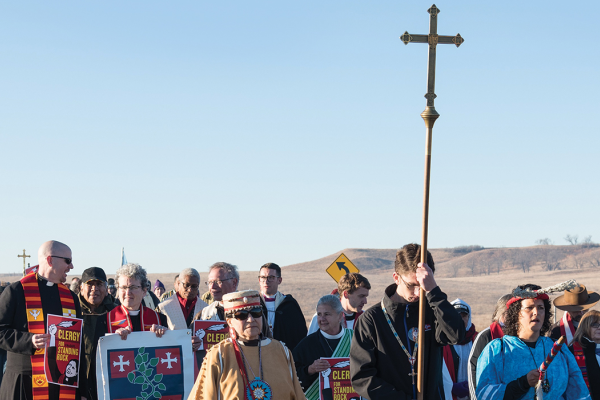THE STANDING ROCK Sioux Nation has actively opposed the construction of an oil pipeline intended to cross the Missouri River adjacent to their land since learning of the planned route in 2014. Joined first by Native American tribes from across the country, and more recently by others including military veterans and clergy, the “water protectors” scored a major victory in December when the U.S. Army Corps of Engineers denied permits for the construction of the river crossing and, as we went to press, began examining the environmental impact of alternative routes. —The Editors
A thin layer of smoke from dozens of campfires hung low in the air over the Oceti Sakowin camp the morning of Nov. 3. More than 500 faith leaders had assembled at the camp’s sacred fire in solidarity with water protectors who have held vigil on the shores of North Dakota’s Cannonball River since April.
Rev. John Floberg, supervising priest of the Episcopal churches on the North Dakota side of Standing Rock, led the gathered clergy encircling the camp’s perpetual sacred fire in a ceremony of apology and repudiation of the Doctrine of Discovery, the papal edict issued in 1493 granting Western colonizers the right of dominion over Indigenous peoples and lands.
Leaders from faith groups that officially have repudiated the Doctrine of Discovery—including Baptist, Episcopal, Lutheran, and Presbyterian—joined Floberg in the speakers’ area facing tribal elders, where they each read a portion of an adapted repudiation statement crafted by the World Council of Churches. Following the apology, copies of the Doctrine of Discovery were offered to the elders who were asked if they wanted to place the documents in the sacred fire. After conferring, one elder said, “This paper, these words, do not belong in a sacred fire.” They chose instead to burn the documents in vessels placed between faith leaders and tribal elders.
Read the Full Article

